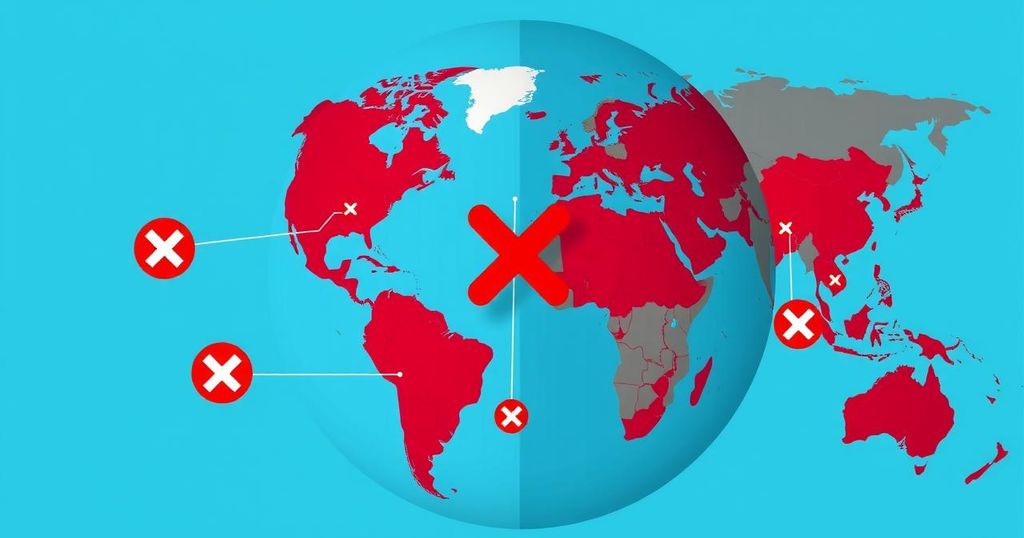The U.S. Department of State has added South Sudan to its “Do Not Travel” list, citing severe risks like violence and kidnappings, thereby crippling its tourism sector. This advisory, indicative of broader global instability, threatens travel options and foreign investments, affecting tourism-related businesses and operations involving aid workers and journalists in the region.
On March 10, 2025, the U.S. Department of State added South Sudan to its highest-risk “Do Not Travel” list. This decision was made due to a surge in violence, armed conflict, crime, and kidnappings, effectively removing South Sudan as a travel destination. The advisory is expected to lead to reductions in airline operations and a decline in foreign investments in the tourism sector, further destabilizing South Sudan’s fragile economy.
Increasing global instability and threats from terrorism and crime have led to these travel advisories, which severely affect local economies and global tourism trends. The state’s long-standing issues with political instability, ethnic violence, and weak governance have exacerbated the situation; the U.S. recently ordered the departure of non-emergency personnel, indicating heightened security concerns.
The advisory explicitly warns about violent crimes such as carjackings, shootings, armed robberies, and kidnappings, with armed groups prevalent across the nation. The accessibility of firearms amplifies risks, particularly for foreign nationals including journalists, who face harassment for reporting without state approval. The deterioration of the security situation has rendered tourism in South Sudan unviable.
Although South Sudan has potential for wildlife tourism and cultural experiences, the current advisory has dashed hopes for any recovery based on tourism. Tour operators specializing in adventure tourism will likely experience significant declines in bookings, as air travel becomes increasingly challenging due to possible suspensions of flights.
Tourism-related businesses, such as hotels, tour guides, and transportation services, will struggle to stay afloat amid this advisory. Foreign investors usually avoid countries on the “Do Not Travel” list, which means future development projects in South Sudan are likely to be halted, compounding existing challenges.
Most visitors to South Sudan include aid workers, journalists, and business professionals; however, even these individuals now face heightened risks of violence and kidnappings, prompting organizations to reconsider operations in the region. The country now joins a list of nations under severe U.S. travel restrictions, facing unique but critical threats to tourism and business activities.
The advisory aligns South Sudan with countries such as Yemen, Venezuela, Russia, Libya, Ukraine, Central African Republic (CAR), and Haiti, many of which have ongoing security threats deterring tourism. Each of these nations confronts severe risks such as terrorism, civil unrest, and kidnappings, which have incapacitated their tourism potential and business operations.
In Yemen, for instance, terrorism and civil war prevail, leaving Americans without consular support as the U.S. Embassy has been closed since 2015. Venezuela is marked by high crime and arbitrary detention, while Russia’s tensions following its invasion of Ukraine have heightened hostility towards U.S. travelers. The instability in Libya, Ukraine, CAR, and Haiti continues to reflect a dire trend impacting global travel.
The addition of South Sudan to the U.S. “Do Not Travel” list signals another challenge for the global tourism industry. Rising conflicts and crime trends demand resilience and adaptation from stakeholders in travel. For the time being, both tourists and businesses must reevaluate their plans while countries grapple with the implications of this evolving security landscape.
The recent inclusion of South Sudan on the U.S. “Do Not Travel” list illustrates the growing challenges facing global tourism due to rising instability and violence. As the tourism sector grapples with these new realities, stakeholders must reassess their strategies and operations. The advisory not only diminishes travel options but also indicates a broader trend of increasing risks in various regions, significantly affecting local economies and international travel patterns.
Original Source: www.travelandtourworld.com






